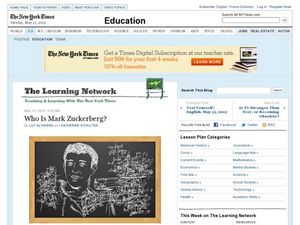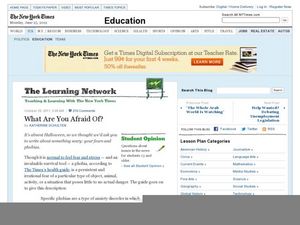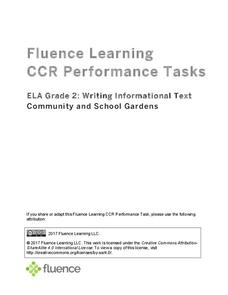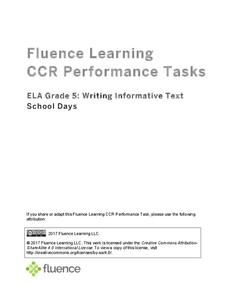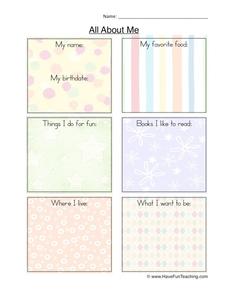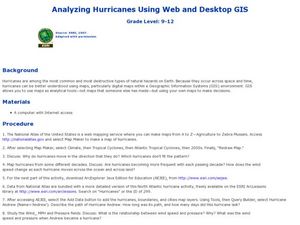Curated OER
Big Branding on Campus: Reading Informational Text
This New York Times "Learning Network" activity poses 11 questions on an article and video about commercial branding and marketing on college campuses. The related article, "On the Market: Thinking Critically About Advertising", is...
Curated OER
Using Chart Information
In this math worksheet, learners determine how many miles it takes a family to read 6 destinations. Students also write an itinerary that shows how many miles the family must travel each day.
Curated OER
Who is Mark Zuckerberg?: Reading Informational Text
This New York Times "Learning Network" exercise provides 10 questions that apply to an article about Mark Zuckerberg. It poses key journalistic questions like, who, what, why, where, how, and when. This resource provides a nice, short...
Curated OER
Interactive Student Notebook for Middle School ELA
Encourage creative, independent, and reflective thinking and writing throughout the school year by having your class members keep Interactive Student Notebooks (ISN). Here you'll find a presentation designed to introduce students to the...
Curated OER
Student Opinion: What Are You Afraid Of?
A great resource for informational texts as well as writing topics, the New York Times website provides writing prompts about various news articles through The Learning Network. This particular worksheet provides a very short reading...
Polk Bros Foundation
I Can Locate and Classify Information About a Topic
After reading a text, ask your pupils to recall and organize what they've just learned into a blank three-column chart. Class members write the topic and fill in the columns with information. The sheet also prompts students to write a...
Florida Center for Reading Research
Comprehension: Text Analysis, Persuade, Inform, and Entertain Sort
Why do authors write? Practice determining the author's purpose with a categorizing activity. Learners sort twelve short passages into three categories: persuade, inform, and entertain.
EngageNY
Editing and Publishing: Accessing Books Around the World Informative Paragraph
Provide time to polish paragraphs in class. Pupils, who have been working on these informational pieces for several days now, will have a chance to check for spelling and grammar before publishing their work. Sure to be a rewarding final...
Laura Candler
Time Capsule
It's amazing how much kids change from the beginning of the year to the end. Create a written account of their growth with a fun worksheet that involves children recording information about themselves at two points during the school...
Fluence Learning
Writing About Informational Text: The Dred Scott Decision
Looking for a performance assessment that asks individuals to demonstrate their competency in writing about informational text? Use Frederick Douglass' essay "On the Dred Scott Decision," and an excerpt from Abraham Lincoln's 1857 speech...
Fluence Learning
Writing About Informational Text: Political Parties
To demonstrate their ability to craft an analysis of informational text, class members read excerpts from James Madison's "The Federalist No. 10," from George Washington's Farewell Address, and from Thomas Jefferson's First Inaugural...
Fluence Learning
Writing Informational Text: Community and School Gardens
Two informational texts feature community gardens of the past and present and how seeds grow. Scholars read, discuss what they have read, complete a timeline, define words, and compose a brief essay about the texts' main idea.
Fluence Learning
Writing About Informational Text: Everybody Can Bike
A three-part assessment challenges scholars to read informational texts in order to complete three tasks. Following a brief reading, class members take part in grand conversations, complete charts, and work in small groups to research...
Fluence Learning
Writing Informative Text: School Days
A three-part writing assessment challenges scholars to think critically about schools of the past and present. Learners read informative texts, answer questions to prepare for a discussion, research in small groups, complete a Venn...
Petite Lemon
Back to School Interview
Gather some information about your class with a quick interview page. Learners fill out responses to a list of prompts, such as favorite color and favorite snack. Individuals can fill out their own information or interview a partner.
Freeology
MyPage
Engage students in sharing about themselves with this social-media-inspired student interest survey. Using the format of a Facebook page, the worksheet asks kids to fill in information about their interests, family, friends, summer...
Have Fun Teaching
All About Me
Get your youngsters to open up about themselves with a quick activity. Class members fill in six colorful and patterned boxes with information such as name, birthday, favorite food, and more.
The New York Times
Fiction or Nonfiction? Considering the Common Core's Emphasis on Informational Text
Nothing aids in comprehension more than an explanation and understanding of why things are done. Address why the Common Core requires the reading percentages that it established and analyze how this affects your readers. Learners read...
Fluence Learning
Writing About Informational Text: Music and the Brain
Even if you've never picked up a musical instrument, chances are that music has directly impacted your mental and emotional development. Sixth graders engage in a reading activity in which they read two articles on the impact of music on...
Curated OER
Writing an Informal Letter
What is the difference between formal and informal letter writing? Who gets a formal letter? What about an informal letter? This reference page presents different introductions and phrases you might see in each type of letter, and then...
Curated OER
Formal and Informal Language
Use this resource to prepare your class for an interview unit, a presentation activity, or to simply rid their writing of informal expressions. It prompts learners to identify whether listed expressions are formal or informal. Note: The...
Curated OER
Analyzing Hurricanes Using Web and Desktop GIS
Students analyze hurricanes. In hurricanes activity, students use the Internet and GIS to analyze hurricanes. Students view the National Atlas of Maps to discuss the direction hurricanes move. Students study the wind and pressure fields...
English Enhanced Scope and Sequence
Differentiate between Formal and Informal Language
The Pledge of Allegiance, the Gettysburg Address, the National Anthem, and the Preamble to the Constitution all get close attention in an exercise that asks learners to rewrite these formally-worded documents into informal language....
EngageNY
Informal Proofs of Properties of Dilations
Challenge the class to prove that the dilation properties always hold. The lesson develops an informal proof of the properties of dilations through a discussion. Two of the proofs are verified with each class member performing the...
Other popular searches
- Student Information Systems
- +Student Information Systems
- Student Information Survey
- Student Information Form
- Student Information Sheets
- Student Information Card
- Student Information Books
- Drawing, Student Information
- Drawing Student Information




